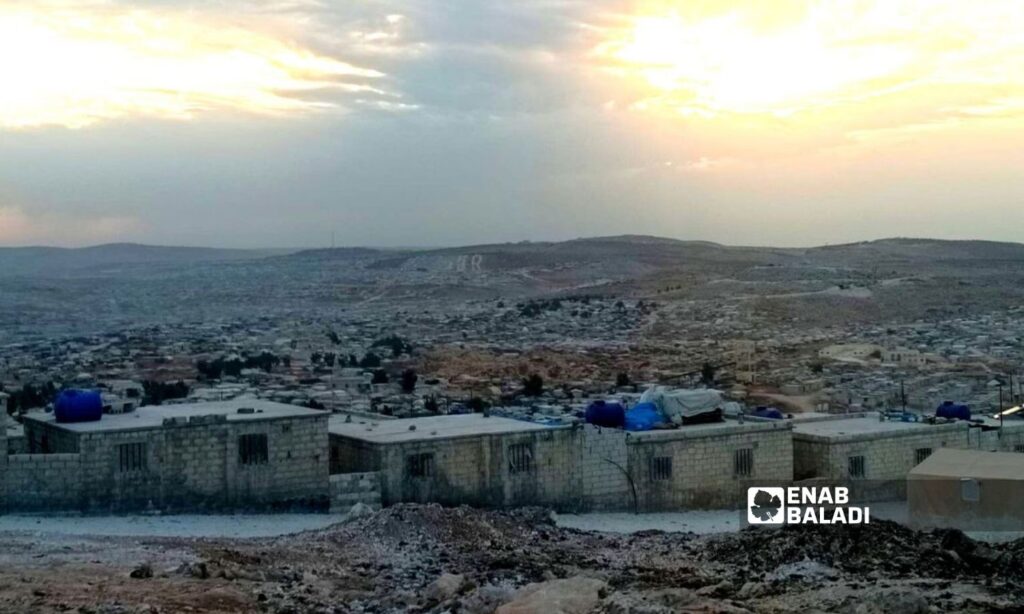Idlib – Huda al-Kulaib
“I will not go back as long as the Assad regime is still there,” says Ruwaida al-Dodi, refusing to return to her city of Maarat al-Numan in the northern Idlib governorate after the regime announced its readiness to receive the returnees and to “settle” their political and security conditions.
The Syria Civil Defense team monitored, at the end of 2019, the effects of the destruction in Maarat al-Numan, after it was subjected to intense bombardment by Russian and Syrian warplanes.
Al-Dodi, in her forties, told Enab Baladi that she prefers to stay in her tent, which does not protect against the heat of summer or the cold of winter, and bears the forms of suffering and lack of resources, rather than yielding to the regime’s demands and returning to its areas of control, after what they saw of the horrific massacres committed against the city’s residents.
“I lost two of my sons in the bombing that affected the city’s markets when the lava of cannons and planes rained down on the heads of children and innocent people,” she said, adding, “Who can forget the blood of our children and how do we find safety in the shadow of the machine of death and oppression.”
It is no longer a secret to the Syrians, especially the displaced, the regime’s false allegations behind its desire to return the IDPs despite all its promises and assurances, al-Dodi believes.
Al-Dodi considered that the regime is trapping people to return, noting that what happened in Daraa when it announced “reconciliation” (settlement agreements) followed by the assassinations of a number of former faction leaders and the arrest of many of the people of the province, is evidence of the methodology of the luring going on.
She emphasized that the displaced in her vicinity are not ready to restore this experience with the regime and risk their lives and the lives of their children.
Return to an “unknown fate”
Enab Baladi met many of the displaced people of Maarat al-Numan in the IDP camps of Deir Hassan, Mashhad Rouhin, Atmeh, and Qah.
All of the IDPs expressed their conviction that they will not return and that the return carries with it an unknown fate.
On 15 October, pro-Syrian regime TV channels broadcast reports from Maarat al-Numan, where some families from the city’s residents appeared in the reception center that the regime opened for the people to return to, claiming that they had begun returning to the city and providing basic services to it.
Maarat al-Numan enjoys a strategic site on the international highway Damascus-Aleppo (M5). It is about 300 km from Damascus, about 80 km from Aleppo, and about 60 km from Hama.
After its homes and public facilities were robbed and looted, people and families who were residing within the regime’s areas of control outside the city were allowed to enter.
The city was inhabited by between 85,000 and 100,000 people before the regime announced its control and destruction in early 2020.
Mustafa Haj Youssef, director of the Civil Defense sector in Idlib, told Enab Baladi in December 2019 that the situation in Maarat al-Numan was “catastrophic” and that the city’s population of more than 100,000 people “have mostly become displaced.”
Opponents and political activists considered the regime’s move to allow the return of the displaced residents of Maarat al-Numan to their city as a “farce,” through which the regime is trying to improve its image before the international community to win financial support for reconstruction.
The regime had opened a “settlement” (reconciliation) center for the residents of Idlib governorate early last September in the destroyed city of Khan Sheikhoun in the southern countryside of Idlib, but this attempt did not succeed in persuading the displaced to return.
The regime cannot be trusted
The displaced Alaa al-Bajri, 37, has no intention of returning to what he called “the regime’s lap” after the regime distorted the city and turned it into ruins, witnessing the destruction that it sustained after it was constantly targeted by warplanes and rocket launchers.
Al-Bajri stressed that he does not trust the Syrian regime, which has circumvented its previous reconciliations in order to restore its position in international circles and take revenge on its opponents under the pretext of alleged reconciliations.
Fahd al-Khadija, 55, displaced from Maarat al-Numan, mocked the regime’s recent calls for residents to return to their homes and said the idea resembled suicide.
He pointed out that the city is nothing more than a ghost town with no living conditions, as its neighborhoods have turned into piles of stones as a result of the bombing that targeted it over the past years.
Fahd described the allegations of those who claimed to return to the areas under the control of the regime as mere theatrical.
Activist Ibrahim al-Tanari, 44, a resident of Maarat al-Numan, told Enab Baladi that “since the regime announced that it would allow the return of the people, no family has been reported to have returned to the city,” ruling out that the regime’s offers would receive any response from the displaced now or after a while.
Al-Tanari stressed the people’s lack of confidence in the regime, which killed, arrested, destroyed and displaced, and robbed them of their security, thus cutting off the road to an actual return.

